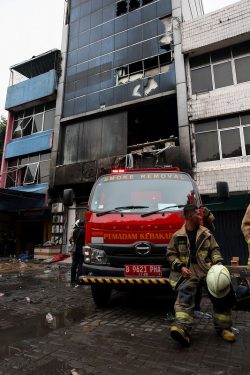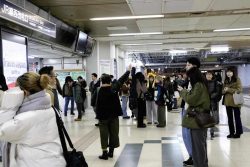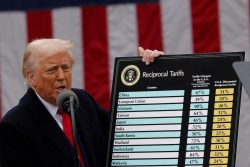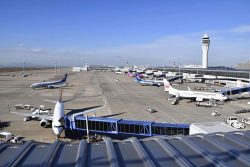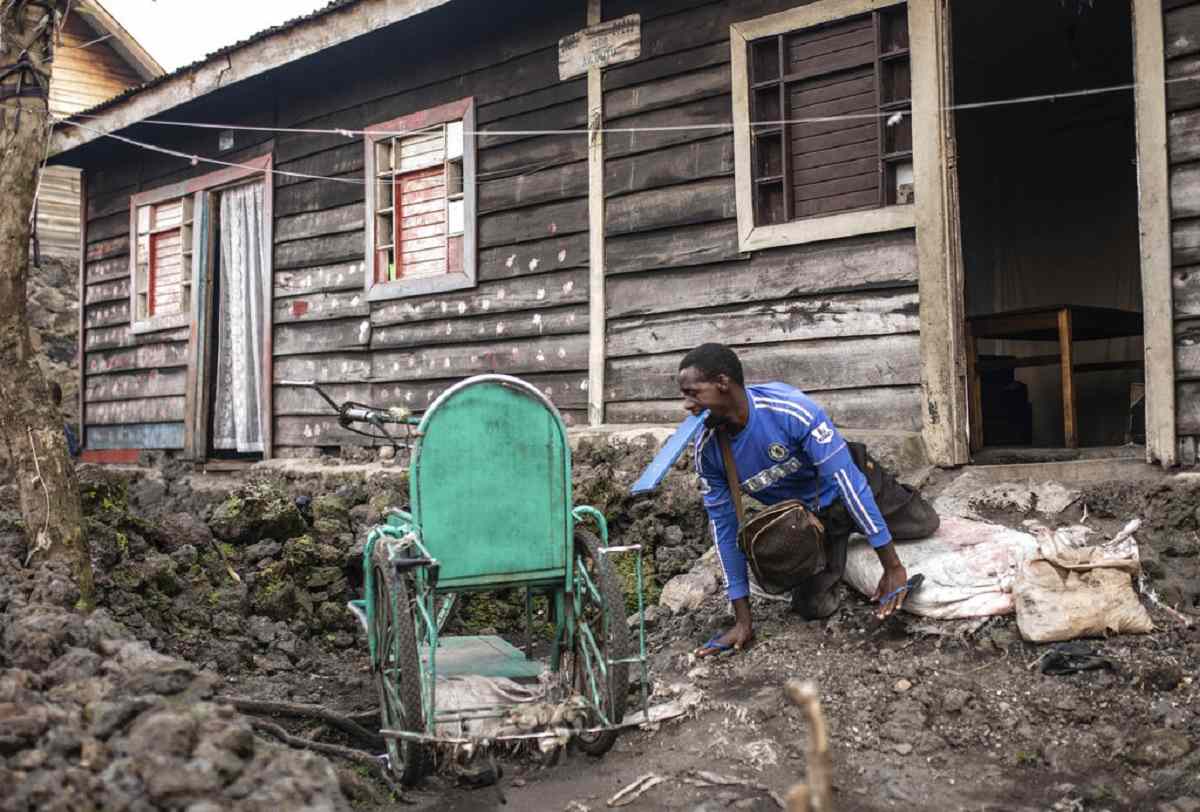
Paul Mitemberezi, a market vendor who has been disabled since he was 3 because of polio, leaves his house for the North Kivu Paralympic League, in Goma, democratic Republic of Congo, Tuesday Jan. 17, 2023.
10:34 JST, January 29, 2023
GOMA, Congo (AP) — When Pope Francis arrives in Congo and South Sudan next week, thousands of people will take special note of a gesture more grounded than the sign of the cross. Watching from their wheelchairs, they will relate to the way he uses his.
The pope, who began using a wheelchair last year, is visiting two countries where years of conflict have disabled many, and yet they are among the world’s most difficult places to find accessibility and understanding. His visit is heartening Catholics and non-Catholics alike.
“We know that it’s a suffering, but it also comforts us to see a grand personality like the pope using a wheelchair,” said Paul Mitemberezi, a market vendor in Goma, at the heart of the eastern Congo region threatened by dozens of armed groups. “Sometimes it gives us the courage to hope that this isn’t the end of the world and one can survive.”
Mitemberezi, a Catholic and a father, has been disabled since he was 3 because of polio. He works to support his family because he can’t imagine a life of begging. On the way to market, his three-wheeled chair crunches the stones of unpaved roads. Without a ramp at home, he must leave the brightly painted vehicle outdoors, at risk of theft.
Every morning, before he leaves for basketball practice, he makes sure the chair’s still there before crawling out his front door. “It is my legs, which helps me to live,” he said. He applies a bicycle pump to the wheels and is off, weaving through traffic of motorcycles and trucks.
Pope Francis is still adjusting to a life that Mitemberezi has long accepted. The pope was first seen publicly in a wheelchair in May, with an aide pushing it. The pope, at age 86, never propels himself. Sometimes he walks with a cane, but he uses the chair for longer distances and has a wheelchair lift to get on and off planes.
Francis has lamented how today’s “throwaway culture” wrongly marginalizes disabled people. He makes it a point to visit places serving them during his foreign trips, and routinely spends time greeting wheelchair users at the end of his general audiences.
“No disability — temporary, acquired or permanent — can change the fact that we are all children of the one Father and enjoy the same dignity,” Francis wrote in his annual message for the U.N. International Day of Persons with Disabilities in December. He said people with different abilities enrich the church and teach it to be more humane.
Such messages are warmly awaited by wheelchair users in South Sudan, where a five-year civil war killed hundreds of thousands of people. As in Congo, data is lacking on just how many people are disabled by conflict or other means.
While the road leading to the Vatican’s embassy in the South Sudan capital, Juba, was paved by city authorities this month for ease of travel, residents who use wheelchairs said they have long gone without easy access to schools, health centers, toilets and other public facilities.
South Sudan, unlike Congo, is yet to ratify the U.N. Convention on the Rights of Persons with Disabilities. Both countries, however, face vast challenges including underfunded health systems, poor infrastructure and conflicts that leave many disabled people vulnerable as others flee. Even displacement camps and shelters often are not accessible, the United Nations has said, and wheelchairs are not always available.
Discrimination is another problem. “People see those who get around using a wheelchair as useless,” said James Moses, who leads a local organization in South Sudan for disabled people and uses crutches after being wounded by a land mine.
He and others called on South Sudan’s government to give them special consideration during the pope’s visit, and they hope that Francis will advocate for them. “He’s close to us,” said Susan Samson, a wheelchair user and mother.
They hope they will have a chance to greet the pope at the airport with congratulatory messages and flowers. ”Put us in front so the pope will see us,” urged wheelchair user Seme Lado Michael.
The Vatican’s ambassador to Congo, Archbishop Ettore Balestrero, said he believed the sight of a wheelchair-using pope could be a powerful teaching moment in a culture where disabilities are often viewed with suspicion and superstition.
Families often abandon their disabled children, he said.
Seeing someone like the pope suffer should make Francis more approachable for people during his visit, Balestrero said. “They identify, in a way, even more with him.”
"News Services" POPULAR ARTICLE
-

American Playwright Jeremy O. Harris Arrested in Japan on Alleged Drug Smuggling
-

Taiwan President Shows Support for Japan in China Dispute with Sushi Lunch
-

Japan Trying to Revive Wartime Militarism with Its Taiwan Comments, China’s Top Paper Says
-

Japan’s Nikkei Stock Average as JGB Yields, Yen Rise on Rate-Hike Bets
-

Japan’s Nikkei Stock Average Licks Wounds after Selloff Sparked by BOJ Hike Bets (UPDATE 1)
JN ACCESS RANKING
-

Govt Plans to Urge Municipalities to Help Residents Cope with Rising Prices
-

Japan’s Hopes for Seafood Exports Shot Down in China Spat
-

Essential Services Shortage to Hit Japan’s GDP By Up to ¥76 Tril. By 2040
-

Japan to Charge Foreigners More for Residence Permits, Looking to Align with Western Countries
-

Japan GDP Down Annualized 1.8% in July-Sept.













